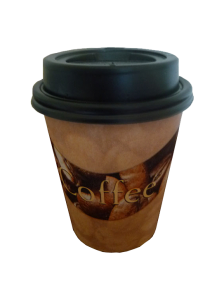McDonald’s and Starbucks pour millions into eco-friendly cup hunt
Posted on October 16, 2019 by DrRossH in Plastic Waste NewsMcDonald’s and Starbucks are pouring millions of dollars into developing eco-friendly alternatives to disposable coffee cups while struggling to find products that can be mass produced, as a global crackdown on plastic gathers pace.
Six sustainable packaging businesses pitched their products before the two chains as well as venture investors at an event last month in New York, held during the UN general assembly meetings where the environment was high on the agenda. Styled after the popular television show Shark Tank, which involves entrepreneurs pitching their products to investors, the event was part of a broader project that McDonald’s and Starbucks have contributed $15m to in partnership with Closed Loop Partners, which pursues sustainable investments.
The sums spent are a tiny fraction of the profits of $5.9bn and $4.5bn that McDonald’s and Starbucks reported respectively last year. Both companies said they have made additional Waste management & recycling
McDonald’s and Starbucks pour millions into eco-friendly cup hunt
Chains struggle to find mass produced alternatives amid global plastic crackdown McDonaldʼs and Starbucks pour millions into eco-friendly cup hunt investments in eco-friendly packaging from their research and development budgets, but declined to give a specific amounts
Despite their name, conventional paper cups for coffee, soup and other hot liquids are not easily recyclable as their inside lining is made of plastic to prevent leaks. Polystyrene foam cups are also not recyclable.
Packaging has become a risk to the fast-food industry which is under pressure from consumers and shareholders to curb the use of plastic. Earlier this year, the European Parliament approved a law to ban
a range of single-use plastic items, including straws and drink stirrers, while France is scheduled to ban single-use plastic coffee cups in 2020. The
Californian city of Berkeley is also set to introduce a 25-cent fee tax on disposable coffee cups.
Those companies that have bet on new products which tap into the growing environmental awareness of consumers have been rewarded. Bunge, one of the world’s oldest agribusinesses, has seen the value of its stake in plant-based burger maker Beyond Meat soar. Bunge’s venture capital arm invested before Beyond Meat’s flotation on the Nasdaq this year.
Venture capitalists are also pushing into the sustainable packaging sector. Abe Minkara, director of business development at Mark Cuban Companies, a collection of businesses owned by the eponymous investor, said he was interested in compostable products. “The material-based solutions are definitely going to be more scalable,” Mr Minkara said. “The closed loop systems are great, but there is a certain behavioural element that is required for that programme to be successful.”
Kate Daly, a managing director at Closed Loop Partners, said solving the sustainable cups problem can pay off in other areas. “We see it as a huge opportunity to take the lessons learned from this project and apply them to other sustainable food packaging opportunities,” she said.
However, fast-food companies are struggling to find a sustainable solution that works on a large scale.
“It is all about scalability,” said Jessica Marshall, sustainability manager at McDonald’s, who attended the event in New York. The group has pledged to recycle packaging at all its stores globally by 2025.
Earlier this year, 44 per cent of Starbucks shareholders supported a motion calling on the company to report on its efforts to develop sustainable packaging. “We know our cups remain one of our biggest environmental challenges,” said Jane Tsilas, global As soon as we scale up we
will be price competitive Henrik Bjornberg, chairman of Colombier
McDonaldʼs and Starbucks pour millions into eco-friendly cup hunt
packaging solutions manager at the Seattle-based group. It is evaluating the cup designs presented in New York last month to determine which it may develop further.
Experts say there are two broad approaches to solving the coffee cup problem. The first involves reusing the same cups: UK-based CupClub provides cups to retailers that can be picked up, cleaned and dropped off again. Meanwhile, RECUP, a company in Germany, has partnered with
McDonald’s stores in the country for a cup deposit system.
However, this option requires customers to be disciplined recyclers and to change their habits. The alternative is to create cups that are recyclable or compostable. US-based Footprint and Colombier
of Finland have produced liners that help with this but these products can be expensive. “As soon as we scale up we will be price competitive,” said Henrik Bjornberg, chairman of Colombier. He said the company wants to open a facility in North America to produce cups as well
as a second processing machine in Finland.
Three businesses at the New York event presented cups that could be exchanged for reuse while the other three had developed cups that can be recycled or composted. About 300,000 tonnes of drinks cups and lids are consumed each year in the EU with about 40,000 tonnes dropped as litter, according to a European Commission report published last year.

 How many people today grab a takeaway coffee cup from the local cafe to drink on the go? We don’t know, but the number must be enormous.. Most every one of the above have a plastic top that will last 100s of years. Some cafes still use plastic cups that last a similar time. Is 10 minutes of coffee worth 100s of years of trash?
These items can be seen littering our gutters and on our streets all over the place. If they were all cardboard, they would still be littered, but they would, at least, be gone in a short time.
They do not need to be made of plastic.
How many people today grab a takeaway coffee cup from the local cafe to drink on the go? We don’t know, but the number must be enormous.. Most every one of the above have a plastic top that will last 100s of years. Some cafes still use plastic cups that last a similar time. Is 10 minutes of coffee worth 100s of years of trash?
These items can be seen littering our gutters and on our streets all over the place. If they were all cardboard, they would still be littered, but they would, at least, be gone in a short time.
They do not need to be made of plastic.
 On the way home from the gym last week, a distance of about 1 km (1/2 mile), I counted the items of plastic litter on the curb as I walked. In that short distance I counted 63 pieces of plastic litter. Plastic drink bottles, bottle tops, candy wrappers, plastic film, polystyrene fragments etc. That seemed to be a lot to me. I guess it is a generational thing. Our parents would have been horrified to see that amount, whereas it seems to go unnoticed by our youth of today. In another 20 years how many pieces will there be on this stretch, -- 200? What will today’s youth think of that new amount then when they are older? Will their children be so readily accepting of a higher amount of litter?
On the way home from the gym last week, a distance of about 1 km (1/2 mile), I counted the items of plastic litter on the curb as I walked. In that short distance I counted 63 pieces of plastic litter. Plastic drink bottles, bottle tops, candy wrappers, plastic film, polystyrene fragments etc. That seemed to be a lot to me. I guess it is a generational thing. Our parents would have been horrified to see that amount, whereas it seems to go unnoticed by our youth of today. In another 20 years how many pieces will there be on this stretch, -- 200? What will today’s youth think of that new amount then when they are older? Will their children be so readily accepting of a higher amount of litter?
Discussion · No Comments
There are no responses to "McDonald’s and Starbucks pour millions into eco-friendly cup hunt". Comments are closed for this post.Oops! Sorry, comments are closed at this time. Please try again later.